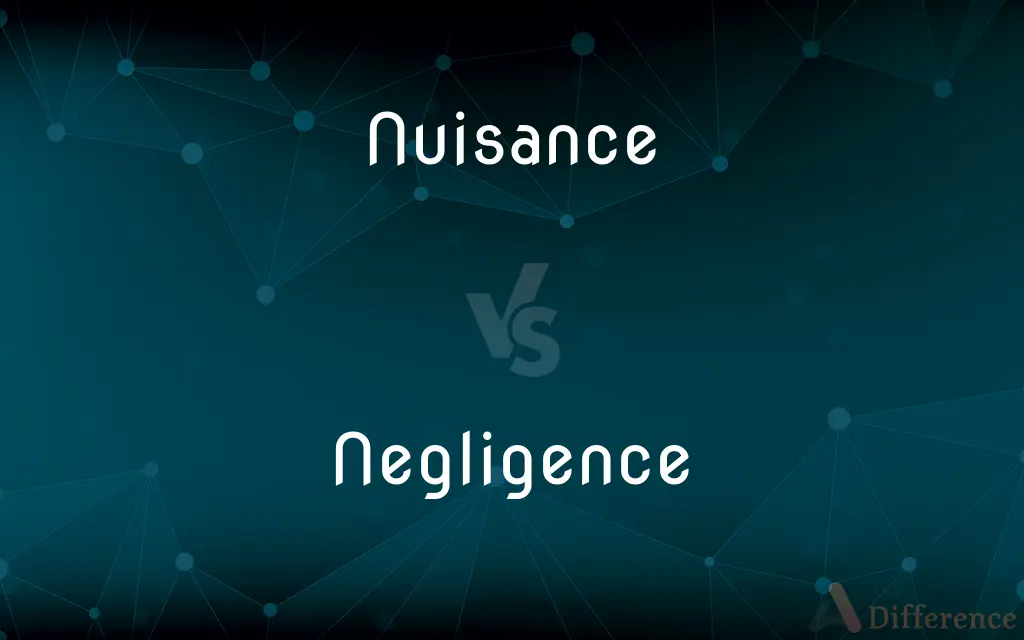Nuisance vs. Negligence — What's the Difference?
By Fiza Rafique & Maham Liaqat — Updated on March 21, 2024
Nuisance refers to an act causing annoyance or disturbance, while negligence implies a failure to take proper care resulting in damage or harm.

Difference Between Nuisance and Negligence
Table of Contents
ADVERTISEMENT
Key Differences
Nuisance typically describes an act or condition that is annoying, inconvenient, or offensive to others, such as a noisy neighbor. On the other hand, negligence denotes a lack of proper care or attention that results in harm or damage, like forgetting to turn off the stove.
While nuisance can involve actions that disrupt the comfort or peace of others without causing direct harm, negligence involves a breach of duty or care that leads to an injury or loss, highlighting a legal responsibility aspect.
Nuisance is often used in both legal and everyday contexts to refer to bothersome situations or behaviors, emphasizing the disturbance to others. Negligence, however, is primarily a legal term that focuses on the failure to act with the prudence or care expected, resulting in negative outcomes.
The concept of nuisance can encompass a wide range of activities, from environmental pollution to excessive noise, without necessarily implying fault or the potential for harm. Conversely, negligence inherently involves a fault or failure in duty, often with legal implications for compensation or remedy.
Nuisance can be classified into public or private, depending on the extent and nature of the annoyance or interference. Negligence, however, is typically assessed based on the deviation from standard care or duty expected in specific situations, like professional conduct.
ADVERTISEMENT
Comparison Chart
Definition
An act causing annoyance
Failure to take proper care
Legal Implications
Can lead to civil action
Basis for liability and damages
Focus
Disturbance or annoyance
Carelessness resulting in harm
Types
Public and private
Various (e.g., professional)
Outcome
Discomfort or inconvenience
Harm or damage
Compare with Definitions
Nuisance
An annoying person or thing.
He's seen as the office nuisance because of his loud talking.
Negligence
Omission of care that a reasonable person would exercise.
Their negligence in not fixing the sidewalk resulted in injuries.
Nuisance
Something that annoys or bothers.
Unwanted calls are more than a nuisance; they're invasive.
Negligence
Failure to exercise the care expected.
The accident was caused by the driver's negligence.
Nuisance
A minor annoyance.
Losing one's keys is a nuisance.
Negligence
Lack of attention resulting in damage.
Negligence in storing chemicals can lead to explosions.
Nuisance
An act or condition causing inconvenience.
The loud parties next door are a real nuisance.
Negligence
Dereliction of duty causing harm.
The guard's negligence led to a security breach.
Nuisance
Legal term for interference with the enjoyment of property.
A lawsuit for nuisance was filed against the factory for pollution.
Negligence
A legal concept involving carelessness.
The hospital was sued for negligence after the patient's death.
Nuisance
Nuisance (from archaic nocence, through Fr. noisance, nuisance, from Lat.
Negligence
Negligence (Lat. negligentia) is a failure to exercise appropriate and/or ethical ruled care expected to be exercised amongst specified circumstances.
Nuisance
A person or thing causing inconvenience or annoyance
I hope you're not going to make a nuisance of yourself
It's a nuisance having all those people clomping through the house
Negligence
The state or quality of being negligent.
Nuisance
One that is inconvenient, annoying, or vexatious; a bother
Having to stand in line was a nuisance. The disruptive child was a nuisance to the class.
Negligence
A negligent act or a failure to act.
Nuisance
(Law) A use of property or course of conduct that interferes with the legal rights of others by causing damage, annoyance, or inconvenience.
Negligence
Failure to use the degree of care appropriate to the circumstances, resulting in an unintended injury to another.
Nuisance
A minor annoyance or inconvenience.
The neighbor's dog barking throughout the night is a right nuisance - I'm going to complain.
Negligence
An act or omission showing such lack of care.
Nuisance
A person or thing causing annoyance or inconvenience.
You can be such a nuisance when you don't get your way.
Negligence
The state of being negligent.
Negligence while driving
Nuisance
(legal) Anything harmful or offensive to the community or to a member of it, for which a legal remedy exists.
A public nuisance
Negligence
The tort whereby a duty of reasonable care was breached, causing damage: any conduct short of intentional or reckless action that falls below the legal standard for preventing unreasonable injury.
Nuisance
That which annoys or gives trouble and vexation; that which is offensive or noxious.
Negligence
The breach of a duty of care: the failure to exercise a standard of care that a reasonable person would have in a similar situation.
Nuisance
(law) a broad legal concept including anything that disturbs the reasonable use of your property or endangers life and health or is offensive
Negligence
The quality or state of being negligent; lack of due diligence or care; omission of duty; habitual neglect; heedlessness.
Nuisance
A bothersome annoying person;
That kid is a terrible pain
Negligence
An act or instance of negligence or carelessness.
Remarking his beauties, . . . I must also point out his negligences and defects.
Negligence
The omission of the care usual under the circumstances, being convertible with the Roman culpa. A specialist is bound to higher skill and diligence in his specialty than one who is not a specialist, and liability for negligence varies acordingly.
Negligence
Failure to act with the prudence that a reasonable person would exercise under the same circumstances
Negligence
The trait of neglecting responsibilities and lacking concern
Common Curiosities
What is the difference between public and private nuisance?
Public nuisance affects the community or public at large, while private nuisance interferes with an individual's enjoyment of their property.
How do courts handle nuisance cases?
Courts may issue orders to cease the nuisance activity or award damages for interference with property enjoyment.
Can businesses be liable for nuisance?
Yes, businesses can be held liable for creating nuisances that affect others' rights or property.
What constitutes a nuisance?
A nuisance is any act or condition that is annoying, disturbing, or offensive to others.
How is negligence determined?
Negligence is determined by a failure to act with the level of care that someone of ordinary prudence would have exercised under the same circumstances.
Can a nuisance be harmless?
Yes, nuisances are often merely annoying or inconvenient without causing harm.
Is negligence always intentional?
No, negligence typically involves a lack of attention or carelessness rather than intentional harm.
What is required to prove negligence?
Proof of duty, breach of that duty, causation, and damages are required to establish negligence.
Can something be both a nuisance and negligence?
Yes, certain actions can be both, especially if they cause annoyance and harm due to carelessness.
What are common examples of negligence?
Medical malpractice, car accidents due to careless driving, and slip and fall accidents are common examples.
Can the government be liable for nuisance or negligence?
Yes, but there are often specific procedures and limitations for bringing claims against government entities.
Can a person be sued for nuisance for a one-time event?
Typically, nuisances require a pattern or ongoing issue, but severe one-time events might qualify, depending on jurisdiction.
How does negligence affect insurance?
Insurance policies often cover damages caused by negligence but may exclude intentional acts.
What are the defenses against a negligence claim?
Common defenses include contributory negligence, assumption of risk, and comparative negligence.
What impact does negligence have on professional licenses?
Professional negligence can lead to disciplinary actions, including suspension or revocation of licenses.
Share Your Discovery

Previous Comparison
Kopis vs. Falcata
Next Comparison
Carom vs. RicochetAuthor Spotlight
Written by
Fiza RafiqueFiza Rafique is a skilled content writer at AskDifference.com, where she meticulously refines and enhances written pieces. Drawing from her vast editorial expertise, Fiza ensures clarity, accuracy, and precision in every article. Passionate about language, she continually seeks to elevate the quality of content for readers worldwide.
Co-written by
Maham Liaqat















































